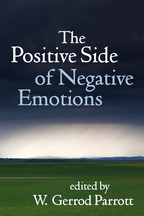The Positive Side of Negative Emotions
Edited by W. Gerrod Parrott
“Superbly edited by a prolific researcher and leader in the field of emotion research….The contributions…are notable for the diverse, fine-grained analyses of emotion regulation they present….Highly recommended. All readers.”
—Choice Reviews
“Parrott is one of the most creative thinkers and gifted writers in the field of psychology. His beautifully rendered articles on jealousy and envy and his classic 'Beyond Hedonism,' still well cited after 20 years, have always left me wanting to read more on these topics. And now we can: Parrott has assembled some of the most intriguing thinkers studying human emotion and asked them to consider how unpleasant emotions from anger to embarrassment to jealousy might actually be adaptive for individuals and societies. The contributors address issues at the heart of basic research as well as clinical practice, and they challenge long-standing assumptions about negative emotions as feelings to 'manage' or even eliminate.”
—Peter Salovey, PhD, President and Chris Argyris Professor of Psychology, Yale University
“This book is a gem! In Parrott’s beautifully orchestrated volume, a select cast of authors share important insights about emotion. Both beginners and experts will be surprised to learn from this engrossing and memorable book how beneficial our negative emotions can be.”
—Gerald L. Clore, PhD, Commonwealth Professor of Psychology, University of Virginia
“An excellent volume that provides an up-to-date overview of a timely topic. This is the first book to integrate the range of existing research on the positive effects of anger, anxiety, shame, sadness, jealousy, and other negative emotions. While offering broad coverage of different emotions and theoretical perspectives, the book has a unifying focus on the counterintuitive notion that negative emotions can be good, even if they feel bad. Students and scholars will feel challenged by the abundance of research and depth of theorizing.”
—Agneta H. Fischer, PhD, Department of Psychology, University of Amsterdam, The Netherlands
Table of Contents
I. Specific Negative Emotions1. Can Sadness Be Good for You?: On the Cognitive, Motivational, and Interpersonal Benefits of Negative Affect, Joseph P. Forgas
2. Anxiety as an Adaptive Emotion, Adam M. Perkins and Philip Corr
3. Anger Is a Positive Emotion, Ursula Hess
4. Can Negative Social Emotions Have Positive Consequences?: An Examination of Embarrassment, Shame, Guilt, Jealousy, and Envy, Nicole E. Henniger and Christine R. Harris
II. Social and Cultural Aspects of Negative Emotions
5. When Negative Emotions Benefit Close Relationships, Levi R. Baker, James K. McNulty, and Nickola C. Overall
6. On the Social Influence of Negative Emotional Expressions, Gerben A. Van Kleef and Stéphane Côté
7. Listening to Negative Emotions: How Culture Constrains What We Hear, Yulia E. Chentsova-Dutton, Nicole Senft, and Andrew G. Ryder
8. The Function of Negative Emotions in the Confucian Tradition, Louise Sundararajan
III. The Desirability of Negative Emotions
9. Why Might People Want to Feel Bad?: Motives in Contrahedonic Emotion Regulation, Maya Tamir and Yochanan Bigman
10. Negative Emotions and the Meaningful Sides of Media Entertainment, Mary Beth Oliver, Anne Bartsch, and Tilo Hartmann
11. The Right Tool for the Job: Functional Analysis and Evaluating Positivity/Negativity, Julie K. Norem
12. Feeling, Function, and the Place of Negative Emotions in a Happy Life, W. Gerrod Parrott
About the Editor
W. Gerrod Parrott, PhD, is Professor of Psychology at Georgetown University. His central interest is the nature of human emotion. His published work has focused on three areas: philosophical and historical approaches to the concept of emotion; emotion's social foundations and functions, including such social emotions as embarrassment, shame, guilt, envy, and jealousy; and the influence of emotion and emotional self-regulation on thought. Dr. Parrott is the author of over 75 scholarly chapters, articles, and books. He is past editor of the journal Cognition and Emotion and past president of the International Society for Research on Emotion.Contributors
Levi R. Baker, MS, Department of Psychology, Florida State University, Tallahassee, FloridaAnne Bartsch, PhD, Department of Media, Knowledge, and Communication, University of Augsburg, Augsburg, Germany
Yochanan Bigman, BA, doctoral student, Department of Psychology, The Hebrew University, Jerusalem, Israel
Yulia E. Chentsova-Dutton, PhD, Department of Psychology, Georgetown University, Washington, DC
Philip J. Corr, PhD, Department of Psychology, City University London, London, United Kingdom
Stéphane Côté, PhD, Rotman School of Management, University of Toronto, Toronto, Ontario, Canada
Joseph P. Forgas, AM, DPhil, DSc, Oxford School of Psychology, University of New South Wales, Sydney, Australia
Christine R. Harris, PhD, Department of Psychology, University of California, San Diego, La Jolla, California
Tilo Hartmann, PhD, Department of Communication Science, VU University Amsterdam, Amsterdam, The Netherlands
Nicole E. Henniger, Department of Psychology, University of California, San Diego, La Jolla, California
Ursula Hess, PhD, Institute for Psychology, Humboldt University, Berlin, Berlin, Germany
James K. McNulty, PhD, Department of Psychology, Florida State University, Tallahassee, Florida
Julie K. Norem, PhD, Department of Psychology, Wellesley College, Wellesley, Massachusetts
Mary Beth Oliver, PhD, Department of Film/Video and Media Studies, Penn State University, University Park, Pennsylvania
Nickola C. Overall, PhD, Department of Psychology, University of Auckland, Auckland, New Zealand
W. Gerrod Parrott, PhD, Department of Psychology, Georgetown University, Washington, DC
Adam M. Perkins, PhD, Department of Psychological Medicine, Institute of Psychiatry, King's College London, London, United Kingdom
Andrew G. Ryder, PhD, Department of Psychology and Centre for Clinical Research in Health, Concordia University, and Culture and Mental Health Research Unit and the Lady Davis Institute, Jewish General Hospital, Montreal, Quebec, Canada
Nicole Senft, BA, Department of Psychology, Georgetown University, Washington, DC
Louise Sundararajan, PhD, private practice, Rochester, New York
Maya Tamir, PhD, Department of Psychology, The Hebrew University, Jerusalem, Israel
Gerben A. Van Kleef, PhD, Department of Social Psychology, University of Amsterdam, Amsterdam, The Netherlands
